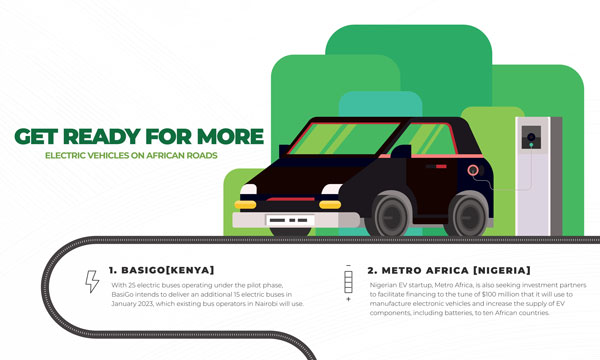
From Kenya to Nigeria, African startups are debuting electric vehicles and unveiling plans for increased fleet deployments, especially in the public transport sector, as electric vehicles roll out across the continent.
Nairobi, Kenya | BIRD AGENCY | Kenyan e-mobility firm BasiGo recently secured $6.6 million in new funding to fast-track commercial delivery of locally-assembled electric buses in the country, just the latest in a string of announcements that suggest that change is coming to African mobility.
With 25 electric buses operating under in its pilot phase, BasiGo intends to deliver an additional 15 electric buses in January 2023, which existing bus operators in Nairobi will use. This latest round brings BaisGo’s total funding in 2022 to $10.9 million.
The announcement came barely weeks after Nigerian e-mobility startup Metro Africa announced that its crowdfunding plans target $100 million, to facilitate electric vehicle parts availability in 10 African markets by the end of 2023.
KenGen, a leading hydroelectric power producer in Kenya, also recently unveiled its first four electric vehicles in an elaborate plan to lead Kenya’s transition from gasoline-powered vehicles to electric cars.
Additionally, BasiGo, which has already unveiled charging infrastructure, will also begin delivering locally-manufactured e-buses under the business’ unique Pay-As-You-Drive financing model. The market is ripe for public e-mobility says CEO Jit Bhattacharya.
“Over 90% of Kenya’s electricity already comes from renewables. Yet Kenya’s transport sector relies entirely on imported petroleum fuels. By electrifying Kenya’s public transport, we can make an immediate dent in climate emissions, clean up the air in our cities, and give bus owners relief from the rising cost of diesel,” the CEO of Kenya’s e-mobility leader said.
Until recently high upfront costs hindered the full adoption of electric buses in most emerging markets. However, with the unique Pay-As-You-Drive model, investors can make bus purchases at prices equal to standard, diesel-powered buses.
Energy producer KenGen is also championing a transition to electric vehicles after it unveiled its first four electric vehicles in Nairobi.
The vehicles, two SUVs and two double-cabin pickups will be used for data collection and company policy development, with the company announcing plans to install about 30 electric vehicle charging points across the country in 2023.
KenGen Acting Managing Director and CEO Abraham Serem indicated that the four EV units would be used as pilot units that will offer the company insights they would use to undertake a comprehensive analysis of the feasibility of e-vehicles.
“In the next one year, we plan to roll out 30 EV charging stations in major cities across the country. The four acquired EVs we are launching today will give the company first-hand experience and data on electric vehicles,” he explained.
Nigerian EV startup, Metro Africa, is also seeking investment partners to facilitate financing to the tune of $100 million that it will use to manufacture electronic vehicles and increase the supply of EV components, including batteries, to ten African countries.
In an interview with Bloomberg, David Hoyme, Metro Africa’s director of international expansion, said the company expects to raise the funds by the end of 2023, enabling it to operate in Cameroon, Uganda and Egypt.
According to Tom Courtright, a Nairobi-based research director at the Association for Electric Mobility and Development in Africa, AEMDA, “the multiplicity of non-electric automobiles in Africa offers it a lucrative opportunity to increase e-mobility in African cities.”
He believes higher outcomes could be anticipated from startups because of the increased number of interested investors. Additionally, most African governments have accommodative policies that will allow the industry to thrive.
“We just need to make sure that consumer education is undertaken alongside educating local investors so that they begin investing in the sector,” he explained.
Courtright believes the future of e-mobility is “prime”, insisting 2023 projections from key players are an indication of the “open arms with which e-mobility has been embraced.”
According to him, e-mobility will be unleashed “the moment we have… a variety of investors pumping resources into infrastructure such as solar panels and batteries.”
According to Mordor Intelligence, Africa’s electric vehicle market was valued at $11.94 billion in 2021 and is projected to reach $21.39 billion by 2027
*****
SOURCE: By Bonface Orucho, bird story agency
 The Independent Uganda: You get the Truth we Pay the Price
The Independent Uganda: You get the Truth we Pay the Price


